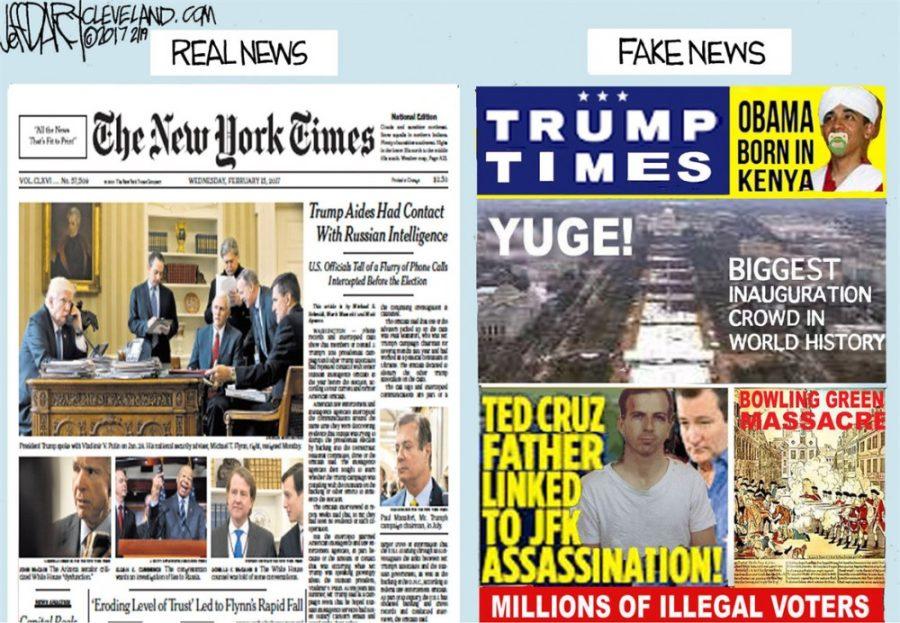The day the phrase “fake news” rose to the forefront of the public eye was the day the entire field of journalism was redefined.
While we know this election season, and subsequent presidency, has been unlike anything we’ve seen before, the war between the president and the press has become one of the biggest challenges of the new administration.
The press has been critical of many presidents, and no president is exempt from judgement while on the job. The press looks to report to the American people, whether it be the good, the bad or the ugly.
So far, President Donald Trump has engaged in a full-on feud with the press. Trump’s press secretary, Sean Spicer, has barred media organizations from White House press briefings. The trend seems to fall with reporting that doesn’t align with Trump’s views. In February, the New York Times and CNN were both barred from a press briefing after Trump accused them of false reporting. It’s become an act, where the president of the U.S. is interacting with the press like he’s in his own reality show. The press, however, only wants to get out of the spotlight.
Related: Arts nonprofits move forward while facing potential budget cuts
Our online society of clickbait and constant sharing on social media has caused fake news to spread like wildfire.
Now, let’s get one fact straight: Fake news is not synonymous with news that doesn’t align with personal beliefs and affiliations.
Despite our president’s claims over Twitter, we can’t rule something as fake news just because we don’t like it or it doesn’t maintain the rosy image he wants the American public to have of him in their head. It’s unfortunate the concept of fake news has turned into more of a joke, where people call well-reported articles fake news simply because they don’t agree with the content. It’s not a matter of agreeing; it’s a matter of reporting what’s right and truthful.
Related: New York Times vice president speaks on issues facing journalists at media law event
There is simply no such thing as alternative facts. Coming up with alternative facts is simply another way of saying you’re lying to cover your tail.
It’s a symptom of the post-truth era, where emotional appeal matters more than the facts.
Since the emergence of social media, people have had more access to news sites, blogs and outlets that primarily focus on entertainment with only the occasional news story. Many millennials would claim their main source of news was Facebook or Twitter. The chance of seeing a millennial reading a print newspaper was low.
Claims of fake news may have drawn some away from outlets to which they were once loyal. Though for the most part, it drove people to go back to traditional media outlets.
Although Trump may claim otherwise, The New York Times saw a spike in subscribers following the election and the inauguration. Following the election, it gained a groundbreaking 41,000 new subscribers—hardly evidence of a dying outlet.
Traditional media from newspapers to TV and radio saw Americans coming in to get the news from the press. While the traditional press may welcome them back with open arms, the battle isn’t over.
If people weren’t skeptical of the press before, having the president suggest the press might be lying has sent many others into a tailspin.
The presidency is a role that traditionally holds a lot of respect in the minds of the American people; they trust the words of their president. The president calling the press liars because they’re reporting facts he doesn’t like has been the test of the entire field.
That’s the battle the press will have to continuously fight in the Trump era. It provides a challenge to news outlets across the country that they’ll willingly accept.
The press acts as a check on the government, and therefore it is the duty of the press to report on their findings. They look to report the facts, not boost the ratings of a president trained in reality TV.
As a journalist, the mentality surrounding fake news is simply exhausting. It feels as though we’re constantly battling those who are skeptical of the press because our nation’s leader is. The press made it clear in the beginning that they would report the facts, and if those facts aren’t as glamorous as one would want, that doesn’t mean they are fake. This all leads to burning questions of “how could you possibly want to enter that field at this time?”
The answer is simple: The field needs those who will tell the truth without seeking reward.
The war on the media between the president and the press has lead many to call both parties a sham. They’re tired of the stage show and over-dramatization of small details.
The American public should know that the press won’t give up on the them. They aren’t the enemy of the people but rather the enemy of corruption. They will continue to fight to get the facts and bring the most truthful stories to them, despite this era of fake news.
Follow Leah Gilchrist on Twitter.









